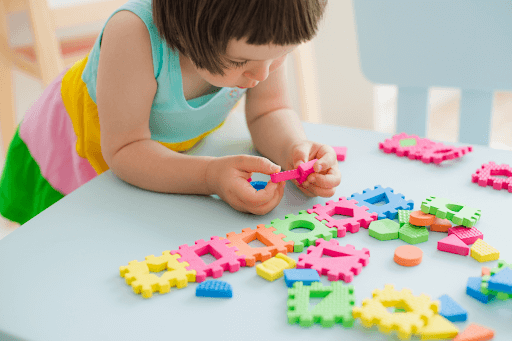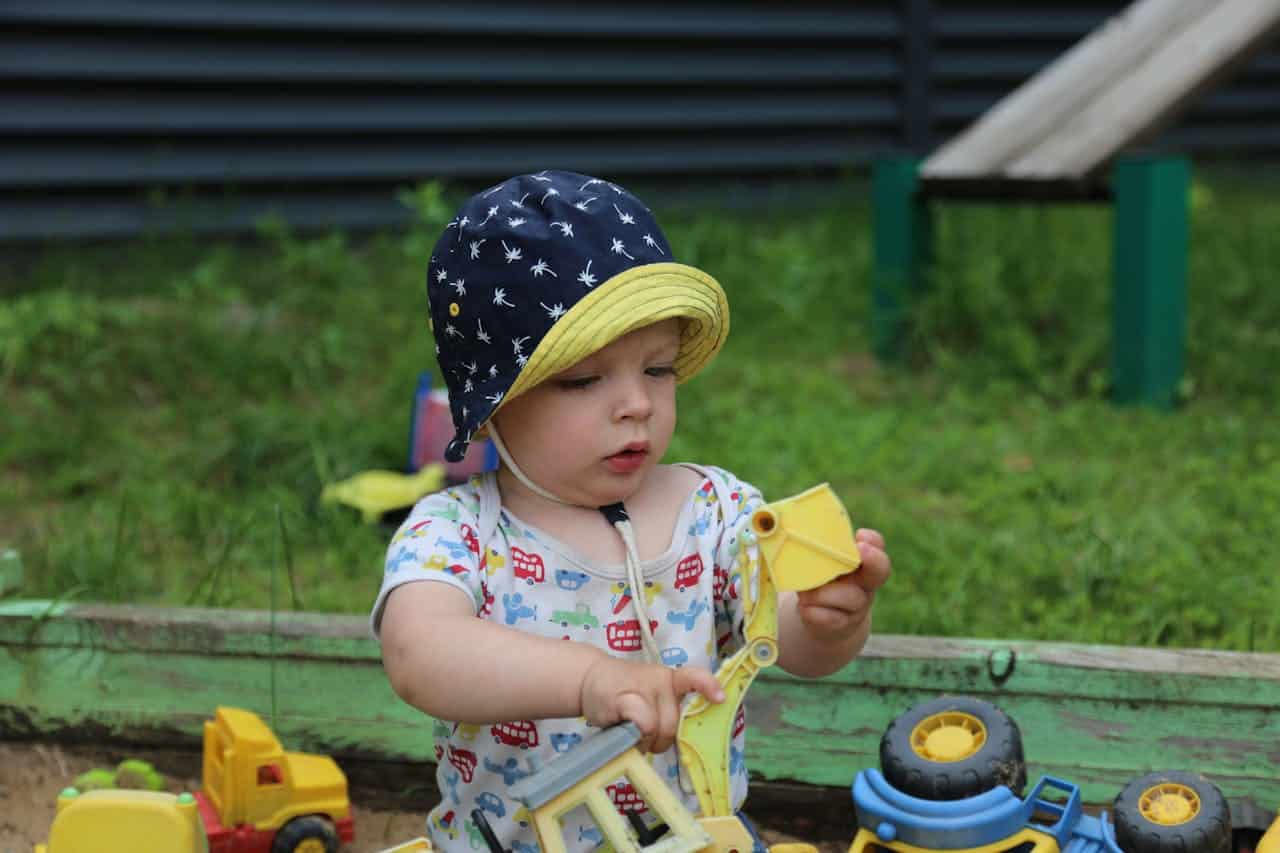
Enhancing Numeracy in Early Childhood
The world is a big, curious place for little ones. And guess what? Numbers play a big part in it. At Shichida, we believe in making maths fun and easy for kids and help parents support the development of numeracy skills. Dive in to learn more!
What is numeracy in early childhood?
In simple words, numeracy is all about understanding numbers and using them in our day-to-day life. It’s not just counting 1, 2, 3; it’s about spotting patterns, figuring out how many apples you have, or sharing toys equally.
The Early Years Learning Framework (EYLF) defines numeracy as having the ability and confidence to apply maths in everyday situations. This includes knowing about numbers, calculations, patterns, areas, measurements, and different shapes.
The importance of numeracy in early childhood can’t be overstated; it shapes a child’s understanding of more complex mathematical concepts in early childhood and builds confidence.
When kids get this right from an early age, they usually find maths a piece of cake later in school.
The Stages of Numeracy Development from Ages 0-5: An Overview
From the day your child is born, they embark on their journey of numeracy development within their first five years. Just by observing and interacting with their surroundings, they begin to lay the foundation for numeracy in early childhood.
Here’s a quick look at how these early childhood numeracy skills typically grow:
Infant Stage (0-1 year): Basic Number Recognition
- Babies begin by associating voice patterns with numbers as parents count their fingers or toes.
- Recognising simple shapes and numbers, such as those seen on everyday items like clocks.
Toddler Stage (1-3 years): Quantity and Basic Comparisons
- Children start expressing desires using numbers, like wanting two slices of apple.
- They begin understanding size differentials, often using terms like ‘big’ and ‘small’.
- Grouping becomes a fun activity, where they classify objects as the ‘same’ or ‘different’.
Preschool Stage (3-5 years): Spatial Awareness and Early Arithmetic
- Spatial terms, including ‘over’, ‘under’, and ‘next to’, help them describe the position of objects.
- They participate in setting tables, ensuring there’s a place setting for each person.
- Pouring liquids, like filling a water bottle, introduces them to volume concepts.
- Shopping trips highlight the importance of currency and offer a hands-on approach to buying and selling.
- They begin understanding division, especially when sharing food equally amongst peers.
Engaging children in such everyday activities enhances their grasp on numeracy concepts in early childhood. These foundational interactions prepare them for the more intricate mathematical challenges they’ll encounter as they grow.
Mathematical concepts in early childhood
Mathematical concepts in early childhood revolve around two essential concepts: non-symbolic number skills and symbolic number skills.
Non-symbolic Number Skills:
What is it? This aspect is about understanding numbers without using actual number symbols. It involves playing with objects and pictures, and grasping quantities through real-world items. For instance, children can combine or separate toys, understanding that two cars plus one car makes three cars.
Why is it important? These tactile experiences help children comprehend basic maths concepts, establishing a foundation for more advanced skills.
Symbolic Number Skills:
What is it? This is the phase where children begin to recognise and use actual number symbols and words, like “2” or “two”. It starts with sequential counting and understanding real-world number applications.
Why is it important? Recognising and comprehending number symbols is essential for higher-level maths skills later in life. Research indicates that children with proficient symbolic number skills during their early years excel in maths as they age.
How can parents support the development of numeracy skills?
There are plenty of ways to help your child become more confident with numbers and to develop their basic numeracy skills.
Make numeracy a part of everyday life
This means incorporating maths in daily moments to boost children’s understanding and interest in numbers.
Always find moments to use maths words
For instance, when talking about quantities, use terms like ‘more’, ‘less’, or when discussing positions, use words like ‘first’, ‘below’, or ‘higher’. During storytime, ask questions related to numbers or positions like, ‘Where is the rabbit? Is it in front of the tree?’ or ‘How many pigs are there?’
Use daily routines to enhance maths skills
Examples include counting foods, or finding patterns outside. These activities help establish a foundation for understanding numbers.
Pay attention when kids use maths during play
This is a chance to dive deeper into their understanding. For instance, if they’re comparing object sizes, give them tools to measure. Participating in their pretend games can also bring up maths-related topics, letting you ask questions that challenge them.
Play games and puzzles
There are many games and puzzles available that can help children develop their numeracy skills. Blocks, puzzles, or sorting materials can foster growth in reading and maths competencies.
Fundamental to these areas are skills such as:
- Reasoning
- Classifying
- Grouping
- Sorting
- Recognising
- Distinguishing
- Symbolising
- Representing
Read books about numeracy
There are numerous children’s books that teach about numbers, shapes, and other mathematical concepts. These can be a useful tool in instilling early numeracy skills. Reading these books together is a great way to bond with your child and help them learn simultaneously.
Peripheral vision and visual tracking
Field of vision exercises are a valuable part of early learning because they support essential skills that children use in everyday activities. At home, parents can incorporate simple, fun activities like bubble popping. Blow bubbles around your child and encourage them to track each bubble with their eyes and pop them with one finger. This fun activity boosts their peripheral vision and hand-eye coordination while they play!

How to Improve Numeracy Skills with Shichida Activities and Games
Make targeting early numeracy activities easy with a range of tools designed specifically for encouraging mathematical concepts in early childhood.
The Shichida Method Dot Card Set
Boost your child’s rapid calculation and arithmetic skills with the Shichida Method Dot Card Set, a flashcard system featuring engaging animal and food designs to captivate and enhance concentration.
Enhance your child’s number recognition and writing skills with the Number Workbook, designed for repeated practice to perfect number formation and comprehension.
The Ten Bead Abacus helps children visually grasp numbers up to ten, fostering a deeper understanding of amounts, number composition, and the relationship between numerals and their values with its distinct sets of coloured beads.
The Panda Domino Number Set offers a playful way to familiarise children with numbers 1 to 10 and, as they grow, introduces them to basic equations through engaging domino arrangements.
Numeracy Activities for Toddlers at Home
Here are some numeracy activities for early childhood to encourage your child’s mathematical understanding and skills:
Classification and Sorting
Sorting and Grouping
What to Do: Provide them with a collection of objects like buttons, pebbles, or toys of different shapes and colours. Ask your toddler to sort them into groups based on colour, size, or type.
Skills developed: Classification, identification of properties.
Matching Socks
What to do: Lay out several pairs of socks, and then mix them up. Ask your toddler to find and pair matching socks.
Skills developed: Pattern recognition, sorting.
Dot-to-Dot Art
What to do: Draw dots on a paper in the shape of an object or animal and number them. Have your toddler connect the dots in numerical order.
Skills developed: Number sequencing, fine motor skills.
Spatial Awareness and Number Recognition
Shape Puzzles
What to do: Use wooden shape puzzles or foam bath shapes. Let your child fit each piece into its corresponding slot.
Skills developed: Shape recognition and spatial awareness.
Numbered Stepping Stones
What to do: Lay out numbered mats, cushions, or paper plates numbered from 1 to 10 in random order. Ask your toddler to hop or step on them in the correct sequence.
Skills developed: Number recognition and sequencing.
Counting Steps
What to do: Every time you ascend or descend stairs with your toddler, count each step aloud.
Skills developed: Basic counting, understanding that numbers represent quantities.
Mathematical Concepts and Practical Skills
Water Play with Measuring Cups
What to do: Fill a basin with water and provide them with measuring cups of different sizes. Let them pour water between cups and see which holds more or less.
Skills developed: Understanding of volume, cause and effect.
Playdough Counting
What to do: Create little playdough balls and place them in groups. Ask your toddler to count each group or combine groups.
Skills developed: Counting, combining, and separating groups.
Grocery Store Play
What to do: Set up a pretend grocery store with empty food containers and price tags. Provide play money and let your toddler “shop” by counting out the right amount for each item.
Skills developed: Counting, early introduction to the concept of money.

Each of these activities not only helps in building foundational numeracy skills for preschoolers but also enhances fine motor skills, cognitive development, and creative thinking in toddlers.
Shichida’s Fun-Filled Approach to Supporting Early Numeracy Skills
For the Littlest Learners (6 months to 3 years old)
At Shichida, we start young – focusing on several skill areas, including numeracy in early childhood! For our tiny tots, it’s all about soaking in the world of numbers. We use fun tools like flashcards and catchy songs to make sure every child, no matter how they like to learn, gets the hang of numbers. We offer baby and toddler enrichment classes for this age group.
For the Growing Minds (4 to 7 years old)
As kids grow, they’re ready to use what they’ve learned. At this age, they start doing their own number-crunching. They’ll work with things like money, time, and simple maths problems. The best part? They’ll see how numbers are connected and make sense of them. We offer kinder and pre-primary enrichment classes for this age group.
Support your child’s potential with numeracy in early childhood with Shichida Australia! Book a trial class and experience our ‘whole brain’ learning program to develop our child’s natural abilities during their most formative years. Our enrollment age cuts off at four and a half years old, even though the program continues up to 9 years old. So, don’t wait!


